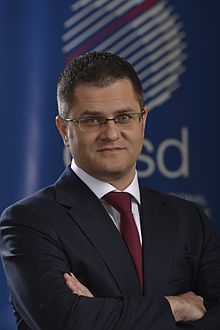Vuk Jeremić
| Vuk Jeremić | |
|---|---|
 |
|
| President of the United Nations General Assembly | |
|
In office 18 September 2012 – 17 September 2013 |
|
| Preceded by | Nassir Abdulaziz Al-Nasser |
| Succeeded by | John William Ashe |
| Minister of Foreign Affairs | |
|
In office 15 May 2007 – 27 July 2012 |
|
| Prime Minister |
Vojislav Koštunica Mirko Cvetković |
| Preceded by | Vuk Drašković |
| Succeeded by | Ivan Mrkić |
| Personal details | |
| Born |
3 July 1975 Belgrade, Yugoslavia (now Serbia) |
| Political party |
Democratic Party (2000–2013) Independent (2013–present) |
| Alma mater |
Queens' College, Cambridge University of London Harvard University |
| Signature | |
Vuk Jeremić (Serbian Cyrillic: Вук Јеремић, Serbian pronunciation: [ʋûːk jěremitɕ]; born 3 July 1975) is a Serbian diplomat who served as Serbia's Minister of Foreign Affairs between 2007 and 2012 and President of the 67th session of the United Nations General Assembly between September 2012 and September 2013.
Jeremić is a native of Belgrade, and was raised in a mixed Christian and Muslim household. His father was the CEO of a prominent state-owned oil company and his mother hailed from a well-known Partisan family, two of whose members were posthumously declared Righteous Among the Nations by Yad Vashem for saving Jews during The Holocaust. In the early 1990s, while he was still a teenager, Jeremić and his parents were forced to leave Yugoslavia after falling out with the country's communist government. Jeremić graduated from Cambridge and Harvard in 1998 and 2003, respectively, and was active in several pro-democracy student movements during the 1990s. In the early 2000s, he joined what The New York Times deemed Serbia's "most westward-leaning government" as an advisor to President Boris Tadić. In May 2007, while Tadić was still in office, Jeremić was appointed Minister of Foreign Affairs. During his tenure, he spearheaded Serbia's fervent opposition to Kosovo's unilateral secession, Serbian authorities arrested a number of war crimes suspects and extradited them to the International Criminal Tribunal for the former Yugoslavia in The Hague, and there was a significant improvement in relations between Serbia and the West. In 2009, the European Union lifted all visa restrictions on citizens of Serbia, and in 2012, declared the country a candidate for membership.
...
Wikipedia
